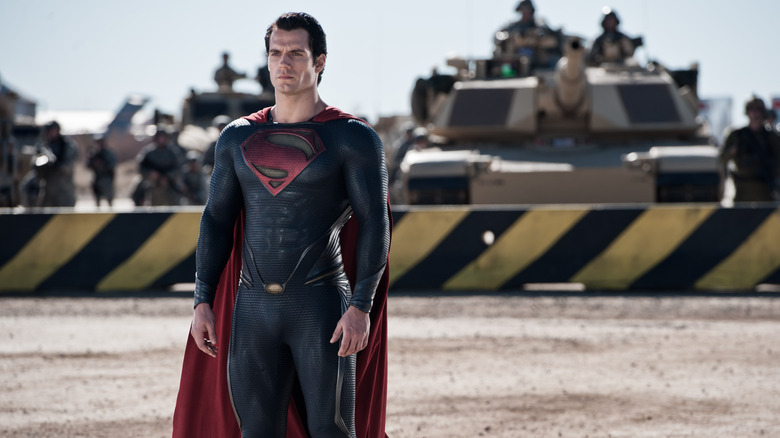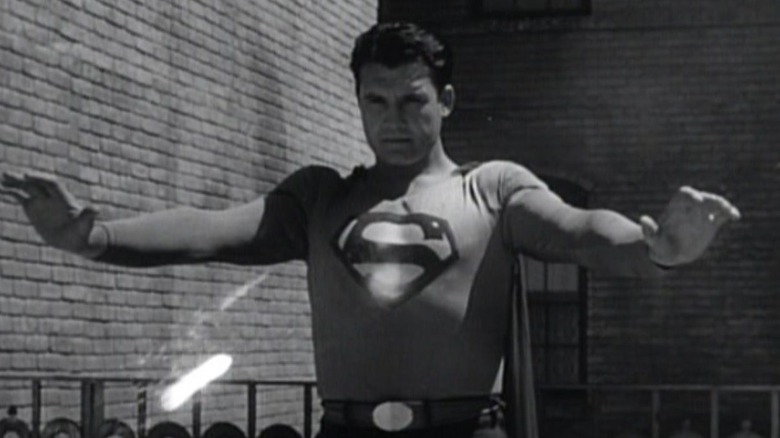Why Casting Isn't James Gunn's Top Priority For Superman: Legacy
Casting superhero characters is important, but at the same time, it's not important. During the '80s and '90s, audiences felt a certain thrill knowing that certain outsize movie stars would be playing Batman villains. Indeed, Jack Nicholson received top billing on Tim Burton's "Batman," and audiences were more keen to see an actor of such stature hamming it up as a murderous gangster clown. The same could be said of Danny DeVito as the Penguin, Michelle Pfeiffer as Catwoman, Jim Carrey as the Riddler, or Arnold Schwarzenegger as Mr. Freeze. Casting, in those cases, was more important than the character.
In the era of the Marvel Cinematic Universe, however, that changed. The characters became more important than the casting. Audiences were drawn to MCU movies because they wanted to see Captain America, not because they were dying to see Chris Evans' interpretation of Captain America. Any number of equally capable actors could have played Captain America, and the MCU would not have been altered one jot. Ditto for Thor, Star-Lord, Black Widow, Captain Marvel, Doctor Strange, and most of the others. Indeed, MCU actor Anthony Mackie was vocal about how the MCU killed the notion of "the movie star." We now live in a post-movie star world wherein characters have supplanted actors. This notion only becomes insidious when one considers the number of pop characters that are played by puppets, CGI avatars, or characters in masks. Pop figures, in some cases, don't even require actors.
Filmmaker James Gunn — who is currently building a cinematic universe based on characters from DC comics — would agree. Talking to Michael Rosenbaum on his "Inside You" interview show in 2023, Gunn revealed that superhero movies are less about actors and more about aesthetics. Costumes and production design supersede performance.
Superman is a costume
Director Sidney Lumet once had a wonderful piece of advice for aspiring directors: make sure everyone is making the same movie. In short, ensure that no single department is cordoned off from the rest of production, crafting in private, making something that may not link into everything else. Gunn noted that his upcoming film "Superman: Legacy" was focused on a unified aesthetic. He wanted the hair stylists, the makers of prosthetics, and the production designers all to be on the same page. This was something he also did with his movies "The Suicide Squad" and "Guardians of the Galaxy, Vol. 3," both of them giant, expensive movies. Gunn said:
"[O]ne thing I noticed early on when I started directing bigger movies is I would watch other big movies – I don't want to name them, but – occasionally I'd see another big movie where it's like, well, you can tell that the costume designer wasn't on the same page with the set designer, wasn't on the same page with the hair designer, and those, they're all individually great pieces of work, but together they don't fit [...] [T]here's an aesthetic that you want to, you know, put against everything."
And when the goal is aesthetic unity, perhaps it's okay to leave casting a little loose. If Superman is all about the look of Metropolis, the cut of the costume, the flip of the hair, then it's less important what actor goes in there. Indeed, ask yourself if you'd watch a Superman movie where he doesn't wear his costume. Superman, Gunn seems to acknowledge, is more costume than man.
Indeed, Gunn went on to say explicitly that actors are not a priority for him.
The production is the star
Gunn noted that "Superman: Legacy" will have "an aesthetic that hasn't existed before." He has been working with Beth Mickle, who worked as a production designer for "The Suicide Squad" and two of Gunn's "Guardians" movies. She also worked on "Only God Forgives," "Collateral Beauty," "Focus," and "Dear Evan Hansen." She is no slouch and Gunn wanted to explain that Mickle was the real star of "Superman: Legacy," not necessarily whoever he casts as Superman. Gunn said:
"[I]t's about creating something different, and so you really need to make sure that everybody ... You know, I started talking about how [production staff] aren't mentioned and I just went on to other stuff. But those people aren't brought up a lot! And you don't understand, everybody's all 'actors actors actors actors.' And the actors are incredibly important, they create a lot. But man, if you talk about an actor versus what Beth Mickle did, who created all the sets? Like, really the biggest voice is Beth's. She's, you know, in terms of what 'Guardians 3' is, Beth is as important as anybody."
A few superhero movies have zeroed in on heroes when they are out of costume. For the bulk of "Iron Man 3," for instance, Tony Stark doesn't use his Iron Man armor, and even has to use dishes and a microwave to dispatch attackers in one scene. When he does use the armor, it doesn't work very well. That film was more about Tony Stark than superhero shenanigans. And although "Iron Man 3" was a hit, many consider it to be among the worst films in the MCU. Aesthetics, costumes, and superhero mayhem come first, and Gunn knows that.
(For the record, I adore "Iron Man 3.")


